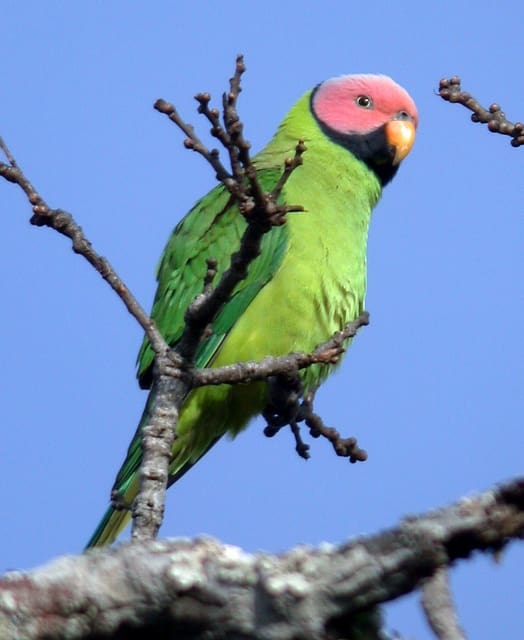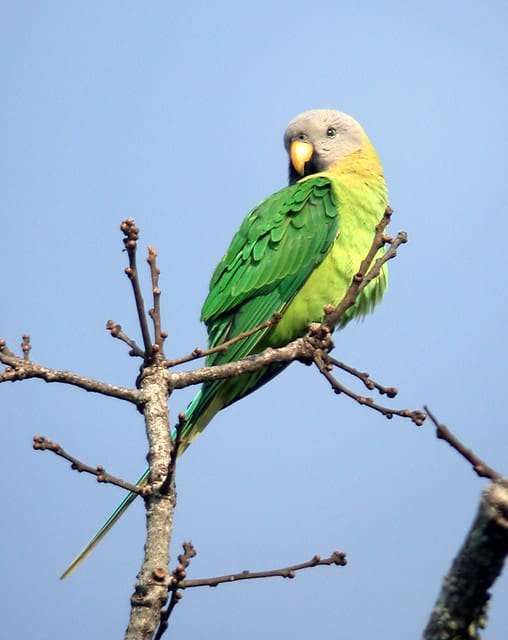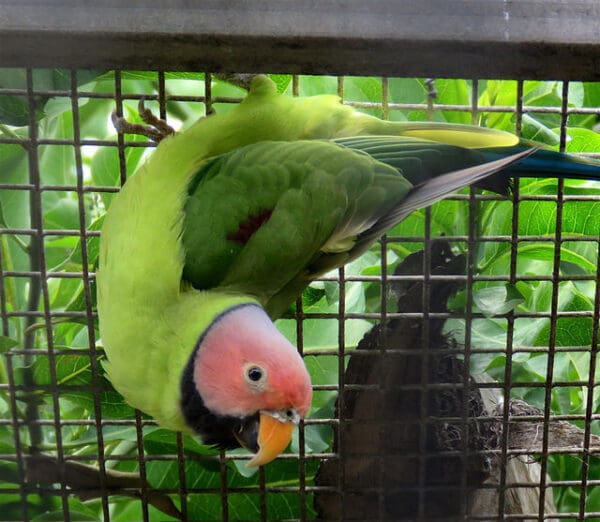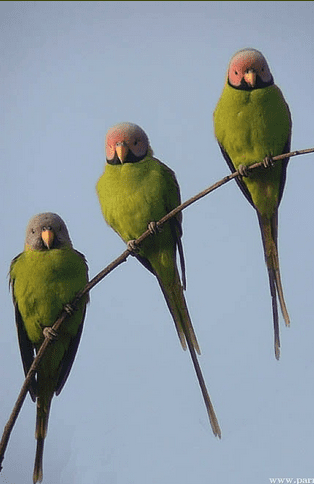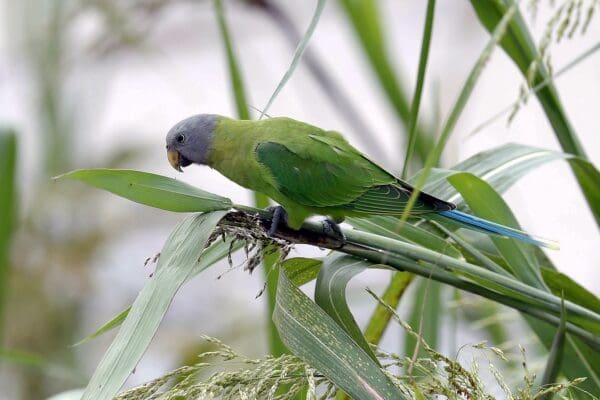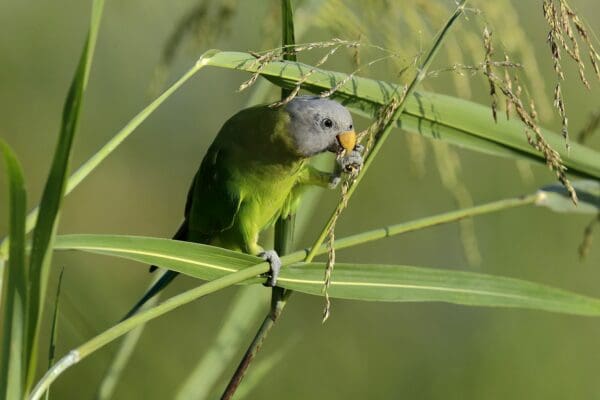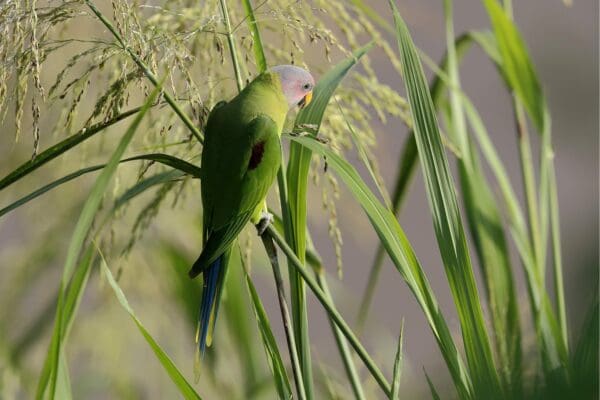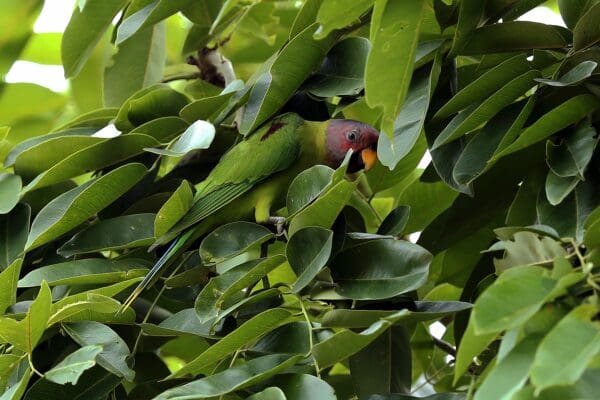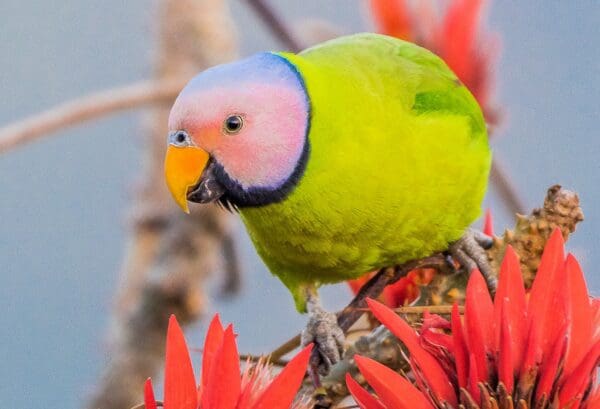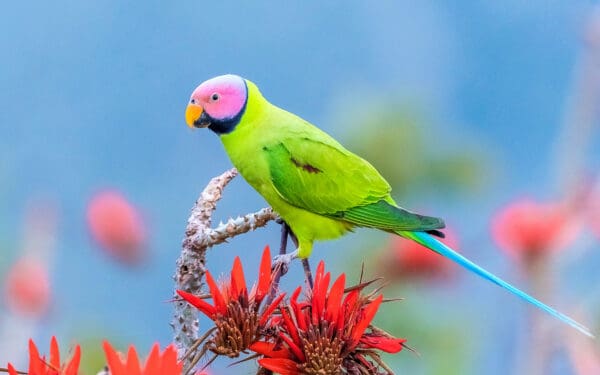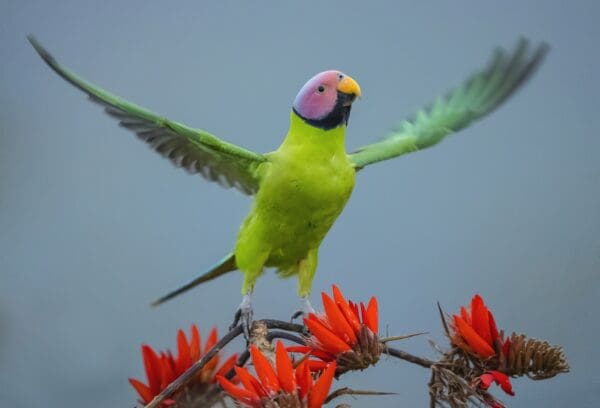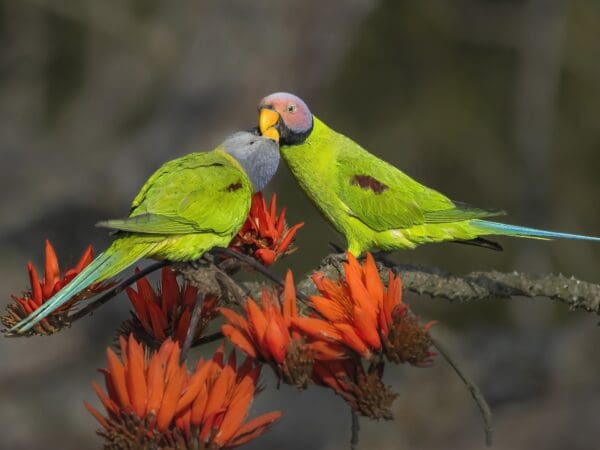![© Len Worthington [CC BY-SA 2.0] via Flickr A wild male Blossom-headed Parakeet perches on a branch](https://parrots.org/wp-content/uploads/2023/01/wpt_Blossom-headed-Parakeet_1282-5-100x100.jpg)
![© Len Worthington [CC BY-SA 2.0] via Flickr A wild female Blossom-headed Parakeet perches atop a tree](https://parrots.org/wp-content/uploads/2023/01/wpt_Blossom-headed-Parakeet_1282-9-100x100.jpg)
![© Florin Feneru [CC BY-NC-SA 2.0] via Flickr A companion male Blossom-headed Parakeet clings to cage wire](https://parrots.org/wp-content/uploads/2023/01/wpt_Blossom-headed-Parakeet_1282-7-100x100.jpg)
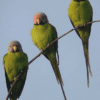
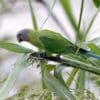
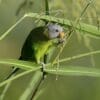
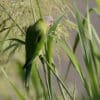
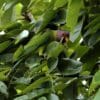
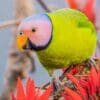
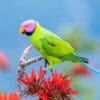
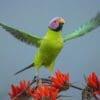
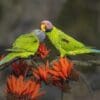
DID YOU KNOW?
This species is notable for the fact that it has been kept in captivity for centuries, having been heavily trapped and imported into Europe by the thousands.

Himalayapsitta

roseata
Size:
30 cm (11.7 in)
Weight:
85-90 g (2.9-3.1 oz)
Subspecies including nominate:
two: H.r. roseata, H.r. juneae
Colour Adult:
H.r. roseata: Male-forecrown, cheeks and ear coverts rosy pink; crown and nape pale blue/purple; chin black; broad band across lower cheeks black, extending as fine stripe around hindneck; brown/red spot on inner middle wing coverts; long central tail feathers blue tipped with pale yellow, the side tail feathers yellow/green tipped with pale yellow. Upper mandible orange/yellow, lower beak dark grey. Eye pale yellow. Female-head dull blue/grey, collar dull yellow/green; red shoulder spot smaller; upper mandible yellow, lower beak dark grey.
H.r. juneae: Both adults as in roseata, but general body colour more yellow; more extensive red shoulder spot or patch; central tail feathers paler in colour, the side tail feathers more yellow.
Colour Juvenile:
Head coloured green; no shoulder patch seen; tail short. Beak pale yellow. Eye grey.
Call:
Calls are described as soft and musical, much like the Plum-headed Parakeet.
Blossom-headed Parakeet – AVoCet Cornell Lab Macaulay Library
More Information:
Content Sources:
CITES
BirdLife International
Cornell Lab of Ornithology/Birds of the World
Parrots: A Guide to Parrots of the World, Juniper and Parr, 1998
Parrots of the World, Forshaw and Cooper, 1977, 1989. 2010 edition
Parrots of the World, Forshaw, 2006.
Lexicon of Parrots, Thomas Arndt.
Parrots in Aviculture, Low, 1992.
Parrots: Their Care and Breeding, Low, 1986.
Captive Status:
Fairly common
Longevity:
15-20 yrs
Housing:
Walk-in aviary, minimum length 3 m (9.8 ft) or if in warm climate use outside flight, 3 x 1 x 2 m (9.8 x 3.3 x 6.5 ft) with shelter and roosting box.
Diet:
Small seed mix such as: canary, millet, safflower and smaller amounts of oats, buckwheat; limited sunflower seed; spray millet; green leaves such as: Swiss chard, kale, lettuce, dandelion, chickweed; seeding grasses; rearing food made up of: hard-boiled egg, wholegrain bread and carrot; fruits such as: apple, orange, pear, cactus fruits, banana, pomegranate; vegetables such as: carrot, celery, peas and green beans, corn; complete kibble.
Enrichment:
Provide chew branches (bird-safe wood only), vegetable tanned leather chew toys, area for bathing, socialization (to overcome shyness), room to fly in large aviary.
Nest Box Size:
9″ x 9″ x 24″ (22.8 cm x 22.8 cm x 61 cm) vertical box.
Clutch Size:
4-5
Fledging Age:
7 weeks
Hatch Weight:
—
Peak Weight:
—
Weaning Weight:
—
World Population:
Unknown, decreasing.
IUCN Red List Status:
Near Threatened
CITES Listing:
Appendix II
Threat Summary:
Is not globally threatened but is now uncommon, particularly in Thailand and Burma. Is affected by forest loss, trapping and persecution. Capture for the cagebird trade is the chief threat to this species, having caused the near-extirpation of it from parts of its range. Over the past three generations, populations are suspected to have declined by 10–29%. In the future, the same rate of decline is inferred, thus this species approaches thresholds for listing as threatened due to possible increased demand for the bird trade.
Range:
H.r. roseata: Bhutan, NE India from Sikkim and Assam south to West Bengal and Tripura, Bangladesh and N Burma; formerly E Nepal.
H.r. juneae: Tripura region and S Assam, NE India, and N Burma east through Thailand, north of Prachaup, to C and S Laos, Cambodia, Vietnam and SE China in southern Guangxi and western Guandong.
Habitat:
Found in light forest, savanna, forest with secondary growth, forest edge, clearings and cultivated land. Up to 1000 m (3280 ft).
Wild Diet:
Reported food items are: flowers and wild pomegranate, nectar, grain including sorghum and maize, fruits including figs and apricots, red peppers and thistle seeds.
Ecology and Behaviour:
Seen in small groups, forming larger parties where food abundant. Joins mixed flocks with Ring-necked, Plum-headed and Red-breasted Parakeets. Roosts communally in dense trees and shrubs.
Clutch and Egg Size:
4-5 almost spherical eggs, 25.0 x 21.0 mm (0.9 x 0.8 in)
Breeding Season:
January-April, May. Nest is in tree hollow; holes in walls and ruins sometimes used.
Related Links:
—
